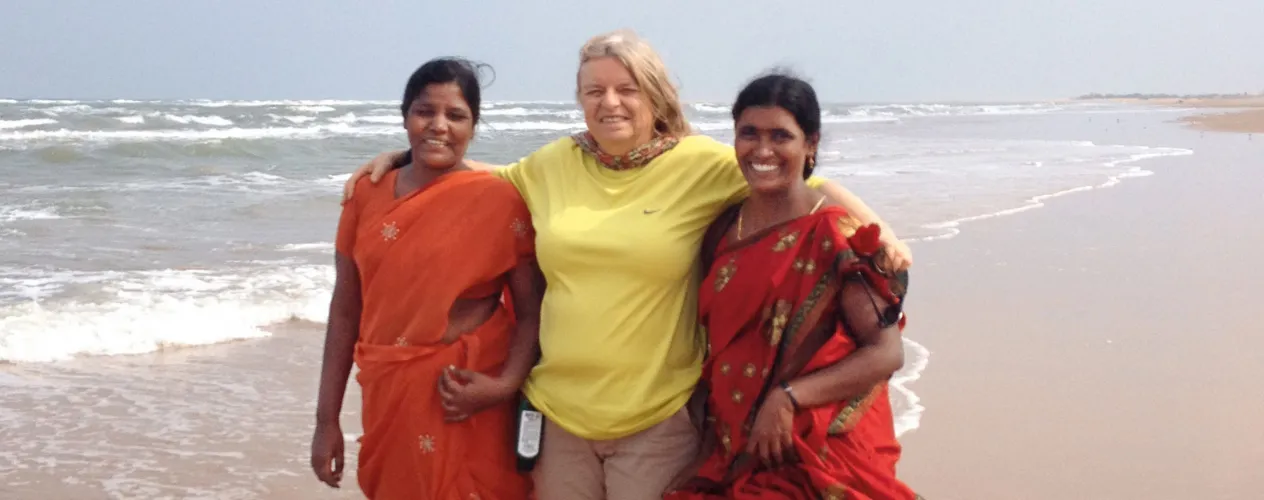In Rural India, Protein as Medicine
FSPH’s Dr. Catherine Carpenter and colleagues have shown the dramatic health improvement that nutrition provides for women with HIV/AIDS living in areas with extreme poverty.

FOR THE PAST 10 YEARS, AS Dr. Catherine Carpenter (PhD ’96) has traveled to India as part of an international research team focused on nutrition and women’s health, she has seen the transformation of many Indian cities into globalized urban areas. “There’s a lot of new construction, a lot of new buildings, especially in Chennai,” explains Carpenter, a UCLA Fielding School professor of epidemiology with joint appointments in the schools of nursing and medicine. “Every time I travel to Chennai, there are new additions — to the airport, to the city — and it’s busy. Then, traveling into the rural areas, one often sees extreme poverty.”
Carpenter’s work in India focuses on the benefits of protein for recovery from malnutrition; the joint Indian-American research team she is part of has worked since 2012 on a variety of randomized nutritional intervention trials seeking to find ways to improve the health of Indian women in rural areas — especially those living with HIV/AIDS.
“Somebody who has HIV/AIDS, who has progressed in terms of the disease, often gets what is called muscle wasting,” Carpenter says. “The disease places a strain on the immune system, and in the context of malnutrition, the body turns to the muscle to supply it with enough protein to support an immune response and you see the characteristic signs of muscle wasting — people with very thin upper arms.”
People living with HIV/AIDS, especially in a setting of widespread malnutrition, are at a high risk of nutritional deficiency and poor nutritional status leading to a weakening of the immune response and worsening recovery, Carpenter explains. Malnourished individuals who start antiretroviral therapy are generally at a higher risk of mortality. In addition, nutrient deficiencies increase the person’s susceptibility to infection from opportunistic diseases (such as human papillomavirus, or HPV; salmonella; and candidiasis, or thrush), which occur more frequently and are more severe in people with compromised immune systems.

A food basket with some of the fruits and vegetables found in Andhra Pradesh, the region of South India where the study was located. The basket contains Indian gooseberry, drumstick vegetable, Indian squash, tomato, pomegrante, and lime.
Searching for answers, Carpenter and her colleagues from UC Irvine, UC San Francisco, and the All India Institute of Medical Sciences in New Delhi have studied the impact of interventions that include protein supplements, nutrition education, and supportive care. The results, summarized in a study published in 2021 in the journal Nutrients, are striking. The 600 women who participated weighed an average of 100 pounds or less when the program began. By the end of the study, the women had not lost weight and some even gained 7 to 9 kilograms — or 15 to 20 pounds. Importantly, the women who received the protein and nutritional education interventions significantly gained lean muscle mass. The researchers also saw a significant increase in CD4 counts, a key immune marker. “The improvements in lean mass and weight are important ways this research can support improving the health of women living with HIV/AIDS, particularly ones who live in impoverished settings,” Carpenter says.
The researchers made a point of using locally grown foods — notably, lentils — and providing education through locally recruited staff. “We didn’t come from the U.S. with protein shakes in a can,” Carpenter says. “This study is important because of what it showed — that making these dietary changes can impact the immune system and the response to disease.”